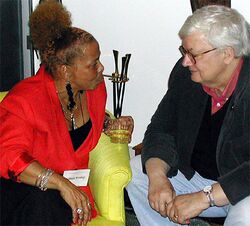Ebert test
The Ebert test gauges whether a computer-based synthesized voice[1][2] can tell a joke with sufficient skill to cause people to laugh.[3] It was proposed by film critic Roger Ebert at the 2011 TED conference as a challenge to software developers to have a computerized voice master the inflections, delivery, timing, and intonations of a speaking human.[1] The test is similar to the Turing test proposed by Alan Turing in 1950 as a way to gauge a computer's ability to exhibit intelligent behavior by generating performance indistinguishable from a human being.[4]
If the computer can successfully tell a joke, and do the timing and delivery as well as Henny Youngman, then that's the voice I want.—Ebert in 2011[2]
Ebert lost his voice after surgery to treat cancer. He employed a Scottish company called CereProc, which custom-tailors text-to-speech software for voiceless customers who record their voices at length before losing them, and mined tapes and DVD commentaries featuring Ebert to create a voice that sounded more like his own voice.[5] He first publicly used the voice they devised for him in his March 2, 2010, appearance on The Oprah Winfrey Show.[2][6][7]
References
- ↑ 1.0 1.1 Adam Ostrow (March 5, 2011). "Roger Ebert's Inspiring Digital Transformation". Mashable Entertainment. http://mashable.com/2011/03/05/roger-ebert-ted-talk/. Retrieved 2011-09-12. "With the help of his wife, two colleagues and the Alex-equipped MacBook that he uses to generate his computerized voice, famed film critic Roger Ebert delivered the final talk at the TED conference on Friday in Long Beach, California...."
- ↑ 2.0 2.1 2.2 JENNIFER 8. LEE (March 7, 2011). "Roger Ebert Tests His Vocal Cords, and Comedic Delivery". The New York Times. http://bits.blogs.nytimes.com/2011/03/07/roger-ebert-tests-his-vocal-cords-and-comedic-delivery/?src=me. Retrieved 2011-09-12. "Now perhaps, there is the Ebert Test, a way to see if a synthesized voice can deliver humor with the timing to make an audience laugh.... He proposed the Ebert Test as a way to gauge the humanness of a synthesized voice."
- ↑ "Roger Ebert's Inspiring Digital Transformation". Tech News. March 5, 2011. http://www.tips-tricks.co.in/2011/03/roger-eberts-inspiring-digital.html. Retrieved 2011-09-12. "Meanwhile, the technology that enables Ebert to "speak" continues to see improvements – for example, adding more realistic inflection for question marks and exclamation points. In a test of that, which Ebert called the "Ebert test" for computerized voices,"
- ↑ Alex_Pasternack (Apr 18, 2011). "A MacBook May Have Given Roger Ebert His Voice, But An iPod Saved His Life (Video)". Motherboard. http://www.motherboard.tv/2011/4/18/a-macbook-may-have-given-roger-ebert-his-voice-but-an-ipod-saved-his-life-video. Retrieved 2011-09-12. "He calls it the "Ebert Test," after Turing's AI standard..."
- ↑ Jones, Chris. "Roger Ebert: The Essential Man". Esquire magazine. February 16, 2010]
- ↑ Ebert, Roger. "Hello, this is me speaking | Interviews | Roger Ebert". https://www.rogerebert.com/interviews/hello-this-is-me-speaking.
- ↑ Tucker, Ken. "'Oprah': Roger Ebert predicts the Oscars, movingly: 'No more surgery for me'". Entertainment Weekly. March 2, 2010
External links
 |


